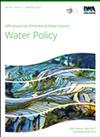Effect of the River Chief System on river pollution control under ‘Responsibility Contracting’: lessons and experiences from China
IF 1.8
4区 环境科学与生态学
Q4 WATER RESOURCES
引用次数: 0
Abstract
Based on whether the ‘One River, One Policy’ is implemented or not, this paper used the questionnaire data of village (community) river chiefs in nine districts and counties under the jurisdiction of Jinhua City, Zhejiang Province, and used the Difference-In-Differences Model to carry out an empirical analysis. The findings are threefold. Firstly, the ‘One River, One Policy’ implemented by primary river chiefs can improve the water quality of the river reaches in their charge. Secondly, annual river patrol times and public support can improve the water quality of the river reaches in charge of primary river chiefs. Thirdly, the River Chief System (RCS) can promote the treatment of river pollution under ‘Responsibility Contracting’, but for primary river chiefs, there is still a suspicion of whitewash pollution control behavior, so whether to establish a long-term mechanism of the RCS is still uncertain. The purpose of this paper is to provide empirical support and decision-making reference for constructing the positive incentive mechanism of the behavior of primary river chiefs in the reconstruction of the RCS, which has important practical significance for effectively improving the RCS and comprehensively promoting the Chinese experiences of river pollution control.“承包责任制”下河长制对河流污染治理的影响:中国的经验与教训
基于“一江一策”实施与否的问题,本文利用浙江省金华市所辖9个区县的村(社区)河长问卷调查数据,运用差中差模型进行实证分析。研究结果有三个方面。首先,由主要河流负责人实施的“一江一策”可以改善其所负责河流的水质。其次,每年巡河次数和公众支持可以改善主要河长负责的河段水质。第三,河长制(RCS)可以促进“责任承包”下的河流污染治理,但对于一级河长而言,仍存在洗白污染治理行为的嫌疑,因此是否建立河长制的长效机制仍不确定。本文旨在为构建初级河长在流域治理重建中的行为正向激励机制提供实证支持和决策参考,对于有效完善流域治理,全面推广中国河流污染治理经验具有重要的现实意义。
本文章由计算机程序翻译,如有差异,请以英文原文为准。
求助全文
约1分钟内获得全文
求助全文
来源期刊

Water Policy
环境科学-水资源
CiteScore
3.10
自引率
12.50%
发文量
81
审稿时长
6-12 weeks
期刊介绍:
Water Policy will publish reviews, research papers and progress reports in, among others, the following areas: financial, diplomatic, organizational, legal, administrative and research; organized by country, region or river basin. Water Policy also publishes reviews of books and grey literature.
 求助内容:
求助内容: 应助结果提醒方式:
应助结果提醒方式:


